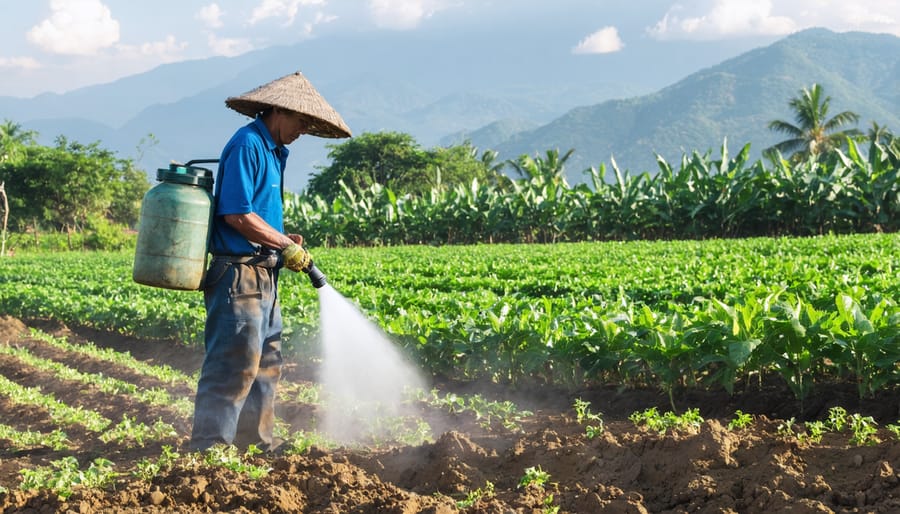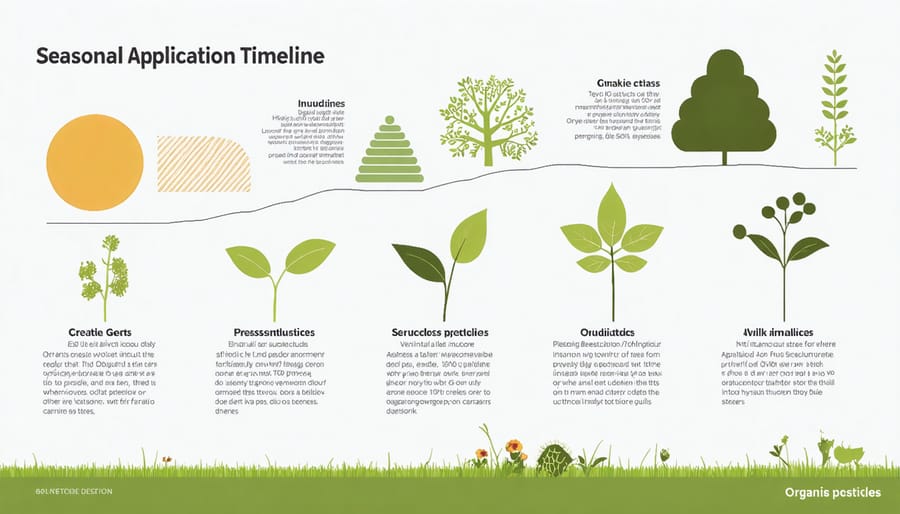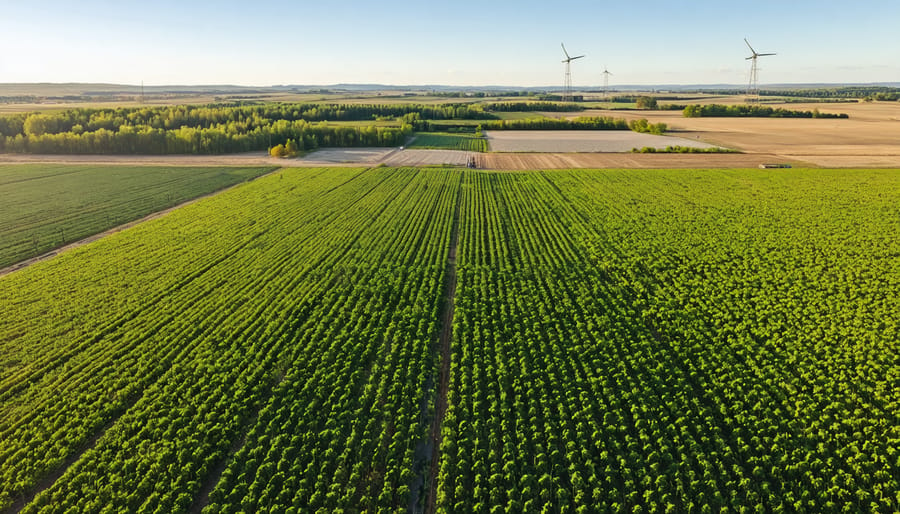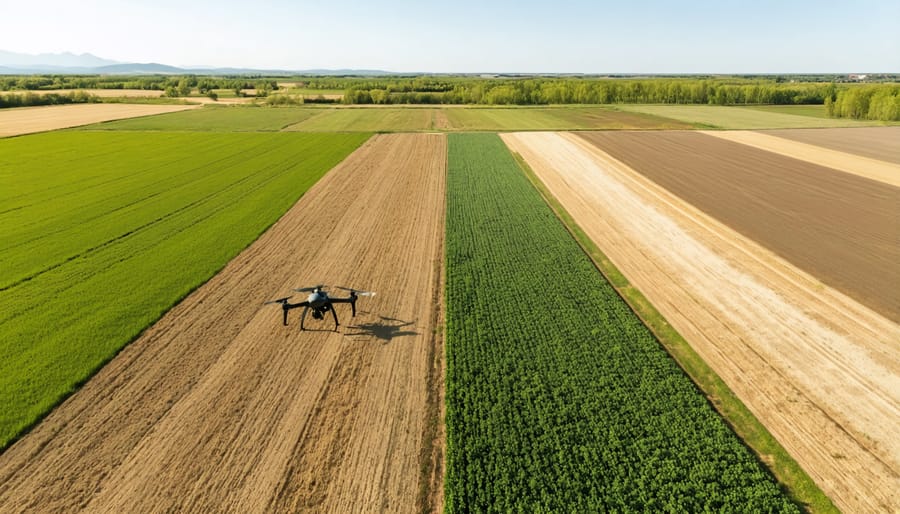Organic pesticides revolutionize Canadian agriculture by delivering powerful crop protection while safeguarding our soil, water, and biodiversity. These natural pest control methods have transformed Alberta’s farming landscape, reducing chemical residues in crops by up to 95% while maintaining comparable yields to conventional methods. From neem-based solutions that effectively combat over 200 pest species to mineral-rich diatomaceous earth that provides lasting protection against soft-bodied insects, organic pesticides offer Prairie farmers a sustainable path forward. Recent studies from the University of Alberta demonstrate that farms using organic pesticides experience a 40% increase in beneficial insect populations, creating resilient ecosystems that naturally suppress pest outbreaks. These solutions not only protect current harvests but build healthier, more productive soil systems for generations to come, positioning Canadian agriculture at the forefront of sustainable farming practices.
Why Organic Pesticides Are Gaining Ground in Alberta

Environmental Benefits for Canadian Soils
Canadian soils benefit significantly from organic pesticide use, particularly in maintaining the delicate balance of beneficial microorganisms essential for crop health. When farmers revitalize your soil health through organic pest management, they preserve vital earthworm populations and beneficial fungi that naturally enhance soil structure and fertility.
Studies conducted in Alberta’s agricultural regions show that organic pesticides break down more readily than synthetic alternatives, leaving minimal residual impact on soil composition. This natural decomposition process actually contributes to soil organic matter, improving moisture retention and reducing erosion risks common in Prairie provinces.
Local farmers report increased soil biodiversity within two to three growing seasons after switching to organic pesticides. This enhanced soil ecosystem creates natural defense mechanisms against pest invasions while supporting stronger root systems and improved nutrient cycling.
The carbon-sequestration potential of organically managed soils also supports Canada’s climate action goals, with organic farms typically storing 25% more carbon than conventional operations. This dual benefit of pest control and environmental stewardship makes organic pesticides an increasingly attractive option for sustainable agriculture in Canadian conditions.
Meeting Consumer Demand for Chemical-Free Produce
Recent market research shows that Alberta consumers are increasingly seeking chemical-free produce, with organic food sales growing by 15% annually across the province. Local farmers’ markets and grocery stores report that customers are willing to pay a premium of 20-30% for certified organic fruits and vegetables, reflecting a strong commitment to health-conscious and environmentally friendly food choices.
This shift in consumer preferences has created new opportunities for Alberta farmers. According to the Alberta Organic Producers Association, farms using organic pesticides have seen improved market access and stronger relationships with local retailers. Many successful operations, like Red Deer Valley Organics, have built loyal customer bases by emphasizing their natural pest management practices.
The demand extends beyond direct-to-consumer sales. Major food processors and restaurant chains in Alberta are actively seeking partnerships with organic producers to meet their customers’ expectations. This trend is particularly strong in urban centres like Calgary and Edmonton, where health food stores and specialized organic markets continue to expand their presence.
For farmers considering the transition to organic pesticides, this growing market demand presents a compelling business case alongside the environmental benefits.
Proven Effectiveness of Organic Pesticides
Local Success Stories
The Prairie Organic Farm near Lethbridge has become a shining example of successful organic pest management in Alberta. Owner Sarah Thompson reports a 40% reduction in crop damage after switching to neem oil and beneficial insect releases to control flea beetles in her canola fields. “The initial investment was higher,” she notes, “but our soil health has improved dramatically, and we’re seeing better yields year after year.”
In Red Deer County, the Martinez Family Farm has effectively controlled aphids in their greenhouse operations using pyrethrin-based sprays derived from chrysanthemum flowers. Their tomato yield increased by 25% in the past two growing seasons, while maintaining their organic certification and premium market prices.
The Rocky View Collective, a group of five farms near Calgary, implemented a cooperative approach to organic pest management. By sharing resources and knowledge about companion planting and botanical pesticides, they’ve successfully managed grasshopper populations without synthetic chemicals. Their collective experience shows that garlic-based sprays, combined with strategic crop rotation, reduced pest pressure by 60% compared to previous seasons.
These local success stories demonstrate that organic pesticides, when properly implemented, can provide effective pest control while supporting long-term soil health and biodiversity in Alberta’s diverse growing conditions.
Research-Backed Results
Recent studies conducted by Agriculture and Agri-Food Canada demonstrate compelling evidence for the effectiveness of organic pesticides in Canadian farming operations. A 2022 field study across Alberta showed that farms using organic pesticides maintained crop yields within 5-10% of conventional methods while significantly reducing environmental impact.
Research from the University of Alberta’s sustainable agriculture program revealed that organic pesticides, particularly neem-based solutions, achieved an 85% pest control rate in canola fields when applied according to recommended guidelines. These findings were supported by a three-year study involving 50 farms across central Alberta.
The Organic Agriculture Centre of Canada reports that farms using integrated organic pest management experienced a 40% reduction in pest-related crop losses while maintaining soil health indicators at optimal levels. Their data shows that beneficial insect populations increased by 60% within two growing seasons of switching to organic pesticides.
An important 2023 study from the Prairie Organic Grain Initiative found that organic pesticide users saved an average of $75 per hectare on input costs compared to conventional pesticide users, while maintaining comparable crop protection levels. The study also noted improved worker safety outcomes, with a 70% reduction in reported respiratory issues among farm workers.
These findings are particularly relevant for Alberta’s agricultural conditions, where organic pesticides have shown remarkable resilience in various weather conditions and pest pressures typical to the region.

Economic Advantages for Canadian Farmers
Long-term Cost Savings
While organic pesticides may have higher upfront costs, they offer significant long-term financial benefits for Canadian farmers. Studies from Alberta’s organic farming sector show that after the initial 2-3 year transition period, farms typically see a 20-30% reduction in their annual pest management expenses.
These savings stem from multiple sources. Organic pesticides help maintain beneficial soil organisms, reducing the need for frequent soil amendments and fertilizers. Many Alberta farmers report spending 40% less on soil maintenance after switching to organic methods, with some saving up to $200 per hectare annually.
Natural pest control methods also create a self-sustaining ecosystem that becomes more resilient over time. As shared by Jim Thompson, a third-generation farmer from Red Deer, “After five years of organic practices, our pest management costs dropped by half because our soil health improved dramatically.”
Additionally, organic pesticides often have longer residual effectiveness, requiring fewer applications per season. This translates to reduced labour costs and equipment wear, with many farmers reporting savings of 15-25% on operational expenses compared to conventional pesticide programs.
Premium Market Access
Adopting organic pesticides opens doors to lucrative market opportunities through organic certification. Studies from the Alberta Organic Producers Association show that certified organic products consistently command premium prices, often 20-50% higher than conventional alternatives. This enhanced organic farming profitability helps offset initial transition costs and provides long-term financial stability.
Canadian organic certification enables access to both domestic and international markets, particularly the growing U.S. and European Union organic sectors. Local farmers’ markets and community-supported agriculture programs (CSAs) in Alberta report increasing demand for certified organic produce, with waiting lists becoming common for organic suppliers.
Major retailers across Canada, including Sobeys and Loblaws, have expanded their organic sections significantly over the past five years, creating stable distribution channels for certified producers. Additionally, organic certification allows farmers to participate in specialized marketing programs and cooperative selling arrangements, strengthening their market position and providing better negotiating power with buyers.
Implementation Strategies for Your Farm
Getting Started with Organic Pesticides
Starting with organic pesticides doesn’t have to be overwhelming. Begin by conducting a thorough assessment of your current pest challenges and identifying the specific insects or diseases affecting your crops. This helps determine which organic solutions will work best for your situation.
First, explore readily available organic options like neem oil, diatomaceous earth, and beneficial insects. Many Alberta farmers have found success with predatory insects like ladybugs and lacewings, which naturally control harmful pests. Consider starting with a small test area of 1-2 hectares to learn and adjust your approach.
Create a seasonal calendar for pest management, noting when specific issues typically arise. For example, many Prairie farmers apply organic treatments in early spring before pest populations peak. Keep detailed records of application timing, weather conditions, and results to refine your methods over time.
Build healthy soil as your foundation. Well-balanced soil with proper organic matter content (ideally 3-5%) naturally supports plant health and pest resistance. Implement crop rotation and companion planting to naturally deter pests and reduce their impact on your yields.
Remember to connect with local organic farming associations and experienced producers. The organic farming community in Alberta is particularly supportive, offering mentorship and sharing practical insights. Many successful organic farmers started small and gradually expanded their organic pest management practices across their operations.
Work with your local agricultural extension office to ensure your chosen organic pesticides comply with Canadian organic standards while meeting your specific pest management needs.
Seasonal Application Guide
In Alberta’s distinct climate, timing is crucial for effective organic pesticide application. The optimal application window typically begins in early spring, around mid-April, when soil temperatures reach 10°C. This early start helps establish protective measures before pest populations peak.
For maximum effectiveness during our growing season, apply organic pesticides in the early morning or late evening when temperatures are between 15-25°C. This timing reduces evaporation and allows better absorption. Avoid application during windy conditions (over 16 km/h) or when rain is forecasted within 24 hours.
Our province’s short growing season demands strategic application scheduling. Begin with a soil-building program in early spring, followed by foliar applications every 10-14 days during peak growing months. For greenhouse operations, maintain a year-round schedule with increased frequency during winter months when pest pressure can be high indoors.
Many Alberta farmers have success using a rotation system: neem oil applications in early season, followed by pyrethrin-based products during mid-season, and bacterial solutions like Bacillus thuringiensis (Bt) for specific pest outbreaks. Always monitor weather forecasts and adjust application timing accordingly – frost events can reduce effectiveness.
Remember to document application dates and results, allowing for refinement of timing in subsequent seasons. This practice-based learning approach helps develop a schedule that works best for your specific location and crop types.

Common Challenges and Solutions
While organic pesticides offer numerous benefits, Alberta farmers often face several challenges when implementing these solutions. One common concern is the higher initial cost compared to conventional pesticides. However, many farmers find that these costs balance out through premium pricing for organic products and reduced long-term input expenses.
Weather dependency can be particularly challenging in our Prairie climate. Organic pesticides may require more frequent applications and specific conditions for optimal effectiveness. To address this, successful farmers often integrate weather monitoring systems and maintain flexible application schedules.
Storage and shelf life present another hurdle, as organic pesticides typically have shorter shelf lives than synthetic alternatives. Many producers overcome this by purchasing in smaller quantities and implementing proper storage practices, including temperature-controlled facilities and airtight containers.
Application timing is crucial and can be more demanding than with conventional pesticides. Local farmers have found success by developing detailed monitoring systems and establishing action thresholds for pest populations. Some operations partner with neighbouring farms to share equipment and knowledge, reducing individual burden and costs.
Efficacy concerns are common among those new to organic pesticides. However, Alberta agricultural experts emphasize that success rates improve significantly with proper application techniques and timing. Many farmers report comparable or better results once they’ve adjusted their approach and expectations to align with organic methods.
Learning from experienced organic farmers in our region has proven invaluable for those navigating these challenges. Local agricultural extension services offer support and training programs specifically designed for organic pest management strategies.
The shift to organic pesticides represents a pivotal opportunity for Alberta’s agricultural community to enhance both environmental stewardship and farm productivity. Throughout this discussion, we’ve explored how organic pesticides offer multiple advantages, from improved soil health and biodiversity to stronger market premiums for certified organic produce. These natural alternatives have proven particularly effective in our unique prairie climate, where sustainable farming practices are increasingly vital for long-term success.
As fellow farmers and agricultural professionals, we understand the importance of making informed decisions that benefit both our operations and the environment. The evidence supporting organic pesticide use is compelling – from reduced environmental impact to enhanced worker safety and increased consumer demand for organic products. Many Alberta farmers who have made the transition report not only environmental benefits but also improved profit margins through premium pricing and reduced input costs.
The time to consider implementing organic pest management strategies is now. Start small by transitioning a portion of your land, connect with local organic farming associations, and learn from experienced organic producers in your area. Resources and support are available through provincial agricultural extension services and organic farming organizations across Alberta.
Remember, sustainable agriculture isn’t just about today’s harvest – it’s about ensuring our soil, water, and ecosystems remain healthy for generations to come. By embracing organic pesticides, we can work together to build a more resilient and sustainable agricultural future for Alberta.











